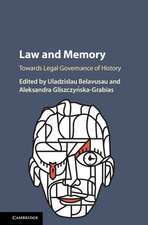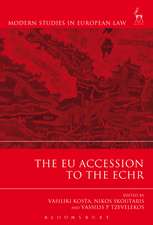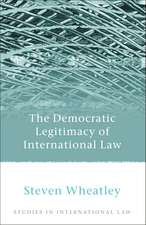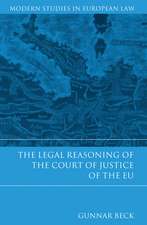EU Anti-Discrimination Law Beyond Gender
Editat de Uladzislau Belavusau, Kristin Henrarden Limba Engleză Hardback – 14 noi 2018
| Toate formatele și edițiile | Preț | Express |
|---|---|---|
| Paperback (1) | 241.51 lei 6-8 săpt. | |
| Bloomsbury Publishing – 18 mar 2020 | 241.51 lei 6-8 săpt. | |
| Hardback (1) | 515.24 lei 3-5 săpt. | |
| Bloomsbury Publishing – 14 noi 2018 | 515.24 lei 3-5 săpt. |
Preț: 515.24 lei
Preț vechi: 734.01 lei
-30% Nou
Puncte Express: 773
Preț estimativ în valută:
98.59€ • 103.21$ • 81.58£
98.59€ • 103.21$ • 81.58£
Carte disponibilă
Livrare economică 15-29 martie
Preluare comenzi: 021 569.72.76
Specificații
ISBN-13: 9781509915019
ISBN-10: 150991501X
Pagini: 392
Dimensiuni: 156 x 234 x 30 mm
Greutate: 0.77 kg
Editura: Bloomsbury Publishing
Colecția Hart Publishing
Locul publicării:London, United Kingdom
ISBN-10: 150991501X
Pagini: 392
Dimensiuni: 156 x 234 x 30 mm
Greutate: 0.77 kg
Editura: Bloomsbury Publishing
Colecția Hart Publishing
Locul publicării:London, United Kingdom
Caracteristici
The chapters cover both the case law of the European Court of Justice and the European Court of Human Rights.
Notă biografică
Uladzislau Belavusau is Senior Researcher in European Law at the TMC Asser Institute (The Hague), University of Amsterdam.Kristin Henrard is a Professor of Law at the Faculty of Law, Erasmus University Rotterdam.
Cuprins
Preface Koen Lenaerts, the President of the Court of Justice of the European Union1. The Impact of the 2000 Equality Directives on EU Anti-Discrimination Law: Achievements and Pitfalls Uladzislau Belavusau & Kristin HenrardPart I Theoretical and Procedural Aspects2. Multiple Discrimination in EU Anti-Discrimination Law: Towards Redressing Complex Inequality? Raphaële Xenidis3. EU Equality Law and Precarious WorkMark Bell4. The Effective Protection against Racial Discrimination and the Burden of Proof: Making up the Balance of the Court of Justice's Guidance Kristin Henrard5. When Equality Directives are not Enough: Taking an Issue with the Missing Minority Rights Policy in the EU?Dimitry KochenovPart II Race and Ethnicity6. Eighteen Years of the EU Equality Directive: A Mitigated BalanceMathias Möschel 7. Romani Marginalisation after the Race Equality Directive Morag GoodwinPart III Religion8. Religious Discrimination in the Workplace: Achbita and BougnaouiEugenia Relaño Pastor9. Unveiling the Culture of Justification in the European Union: Religious Clothing and the Proportionality Review Anna Sledzinska-SimonPart IV Sexual Orientation10. The Impact of Framework Equality Directive on the Protection of LGB Persons and Same-Sex Couples from Discrimination under EU LawAlina Tryfonidou11. EU Law as an (In)Direct Source of LGB RightsPhilip M. AyoubPart V Age12. Justifying Age Discrimination in the EURachel Horton13. EU Age Discrimination Law: A Curse or a Blessing for EU Youth Policy?Beryl Ter HaarPart VI Disability14. Breaking Down Barriers? The Judicial Interpretation of "Disability" and "Reasonable Accomodation" in EU Anti-Discrimination LawLuísa Lourenço and Pekka Pohjankoski15. The Influence of the UN Convention on the Rights of Persons with Disabilities on EU Anti-Discrimination LawLisa Waddington16. Epilogue: The Limits of Transformative Change in European Equality Law Bruno De Witte
Recenzii
The book is a hugely valuable contribution to the existing literature on EU anti-discrimination law and an outstanding piece of scholarly work, providing thought-provoking insights to the way in which the principle of equality applies to race and ethnicity, religion, sexual orientation, age and disability.
For anyone interested in a critical assessment of how EU anti-discrimination law has developed for members of minority groups (religious, ethnic, racial, sexual-identity, others) this is now the place to start, with accessible, readable, thought-provoking chapters by leading and up-and-coming scholars in the field.
This volume goes to the heart of one of the most dynamic and fascinating fields of EU law. We are faced with an excellent contribution, which will be the reference book on EU discrimination law in the years to come, of great benefit to academics, officials, practitioners, judges and anyone interested in anti-discrimination policies in general.
This book is a very special kind of garden guide. It compares today's EU anti-discrimination law with a Garden of Equal Delights. The reason for this, the editors explain, is that despite all its flaws, the EU offers one of the highest standards of protection in comparative anti-discrimination law. Whilst this is true, discrimination is a factually complex field of EU law, and understanding and navigating it is helped immensely by the kind of guide provided by this book.
EU anti-discrimination law is a mixture of significant leaps forward and missed opportunities, which is fairly true for secondary law and decisions of the European Court of Justice. Along these lines, the book edited by Uladzislau Belavusau and Kristin Henrard is a remarkable academic contribution to the development of EU anti-discrimination law beyond gender by diagnosing legal challenges and potential solutions.
Overall, this is a much-welcomed book that brings systematic analysis to the existing EU anti-discrimination law literature and offers remarkable reflections on the achievements of the 2000 Equality Directives, and their shortcomings and avenues, to introduce further improvements in this field.
The contributors to the book, well-known experts in the field and upcoming scholars, paint a picture of EU equality law that highlights its aspirational nature, its diversity as well as its sometimes detectable disorganization. They do so in a convincing, comprehensive and thought-provoking manner ... a detailed, carefully researched analysis, which will certainly influence future debates. Moreover, it is a creative contribution to the field of EU equality law.
[N]o other recent publication can rival EU Anti-Discrimination Law beyond Gender in terms of diversity and the importance of perspectives. The well thought through structure of this anthology, the excellent choice of authors, and the clear message on the potential ways of empowering the concept and tools of EU law make the book extremely important reading for scholars, practising lawyers, experts and NGO activists.
For [its] focus, as well as for the range and quality of its chapters, the book makes an important contribution to the literature on EU's anti-discrimination law.
For anyone interested in a critical assessment of how EU anti-discrimination law has developed for members of minority groups (religious, ethnic, racial, sexual-identity, others) this is now the place to start, with accessible, readable, thought-provoking chapters by leading and up-and-coming scholars in the field.
This volume goes to the heart of one of the most dynamic and fascinating fields of EU law. We are faced with an excellent contribution, which will be the reference book on EU discrimination law in the years to come, of great benefit to academics, officials, practitioners, judges and anyone interested in anti-discrimination policies in general.
This book is a very special kind of garden guide. It compares today's EU anti-discrimination law with a Garden of Equal Delights. The reason for this, the editors explain, is that despite all its flaws, the EU offers one of the highest standards of protection in comparative anti-discrimination law. Whilst this is true, discrimination is a factually complex field of EU law, and understanding and navigating it is helped immensely by the kind of guide provided by this book.
EU anti-discrimination law is a mixture of significant leaps forward and missed opportunities, which is fairly true for secondary law and decisions of the European Court of Justice. Along these lines, the book edited by Uladzislau Belavusau and Kristin Henrard is a remarkable academic contribution to the development of EU anti-discrimination law beyond gender by diagnosing legal challenges and potential solutions.
Overall, this is a much-welcomed book that brings systematic analysis to the existing EU anti-discrimination law literature and offers remarkable reflections on the achievements of the 2000 Equality Directives, and their shortcomings and avenues, to introduce further improvements in this field.
The contributors to the book, well-known experts in the field and upcoming scholars, paint a picture of EU equality law that highlights its aspirational nature, its diversity as well as its sometimes detectable disorganization. They do so in a convincing, comprehensive and thought-provoking manner ... a detailed, carefully researched analysis, which will certainly influence future debates. Moreover, it is a creative contribution to the field of EU equality law.
[N]o other recent publication can rival EU Anti-Discrimination Law beyond Gender in terms of diversity and the importance of perspectives. The well thought through structure of this anthology, the excellent choice of authors, and the clear message on the potential ways of empowering the concept and tools of EU law make the book extremely important reading for scholars, practising lawyers, experts and NGO activists.
For [its] focus, as well as for the range and quality of its chapters, the book makes an important contribution to the literature on EU's anti-discrimination law.
















